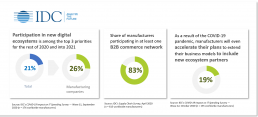While ERP (Enterprise Resource Planning) applications typically enable manufacturers to plan internal resources efficiently, the role of ERP in future business ecosystems will have to accommodate some additional requirements.
IDC Manufacturing Insights sees a shift from internal process optimization to the digital transformation of business-to-business (B2B) processes in the broader manufacturing ecosystem.
In a recently published report, we described the future role of ERP applications in digital business ecosystems, the drivers for the need to transform ERP applications toward ecosystem-enabling ERP applications, and an overview of key capabilities that are relevant for ecosystem-enabling ERP applications.
Key Takeaways From the Report
ERP solutions will play a key role in supporting ecosystem-related B2B operations, but will have to accommodate some additional requirements. What will be the key capabilities, how can ERP improve B2B operations, and what will drive the need to transform into ecosystem-enabling ERP applications?
- Cloud-based applications, open APIs, microservices architecture, advanced analytics, and artificial intelligence (AI) will be key capabilities of ecosystem-enabling ERP applications.
- Drivers for ecosystem-enabling ERP applications are increasing demand for more integrated ecosystem collaboration such as utilizing industry-specific B2B marketplaces, better integration with customers, and closer customer engagements. Drivers will also relate to the rise of digital commerce and new ecosystem-facing business models that necessitate appropriate ERP capabilities.
If you are a tech buyer, you should take this into consideration:
- Tech buyers should focus on ERP vendors that can augment B2B processes and innovation across the digital business ecosystem with technologies that help to improve the efficiency of B2B operations and automate B2B workflows. Such technologies might be related to utilizing APIs and technologies such as artificial intelligence (AI) and machine learning (ML) capabilities.
- Industry domain know-how is key. Work with ERP vendors that understand your specific domain and ecosystem challenges.
- Start to establish an architecture that utilizes cloud-based platforms and APIs to integrate ecosystem stakeholders. If there are existing platforms in place, integrate them into one data platform to establish a holistic ecosystem view.
- Increased ecosystem collaboration in your business strategy necessitates that your long-term vision should include an ecosystem model (digital twin) based on real-time data from all enterprise systems (e.g., ERP, CRM, MES) and other applications (e.g., solutions for payment transactions, marketplace). This will be key to testing new business models, managing ecosystem stakeholders, and predicting ecosystem behaviour. For complex systems and business behavior predictions, utilize AI/ML tools. While this is a more complex endeavor, it will play a major role in the future of ecosystem collaborations.
The full report — Ecosystem-Enabling ERP: The Future Role of ERP in Digital Business Ecosystems — is available for all clients of our Worldwide Manufacturing Business Ecosystem Strategies research program.
If you want to share your thoughts around this, please feel free to contact Stefanie Naujoks, or head over to https://www.idc.com/eu and drop your details in the form on the top right.


